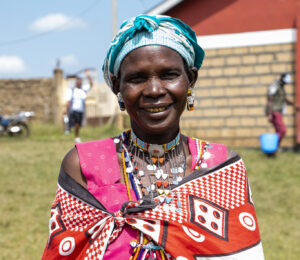AS LONG AS I LIVE
“As a survivor, I know what excision is because I was excised at the age of six, I remember every scream I uttered, every suffering, every pain I underwent, and I don’t even wish it on my worst enemy! That’s, why I’m determined to fight against excision, I’m committed to not hearing about this practice anymore. And as long as I am alive, I will do my utmost to fight against excision in order to save other girls.”
According to Senegal’s Data Health Survey (DHS) 2019, Female Genital Mutilation/Cutting (FGM/C) continues to be carried out by traditional practitioners for women aged 15-49 years as well as for girls aged 0-14 years. 92.8% of women aged 15-49 and 100% of girls aged 0-14 years were performed by a traditional cutter in 2016. Currently, there’s no trend toward medicalisation of the practice in Senegal.
Kadidiatou lives in the Kolda region of Senegal, a province that has one of the highest prevalence rates of FGM/C. She’s a youth champion under Amref Health Africa. “I don’t talk to older people about FGM/C. My target audience is the young people in my school and my friends because excision is considered an ancestral culture, I could be treated badly by the older people when I try to talk to them.”
“I count it a success for carrying out awareness-raising activities in schools, which has enabled me and others to give these pupils the mandate to spread the message in their communities.”
“As for the challenges, there are still people who do not believe us because they think it is a practice validated by the prophet Muhammad (PBUH). But the fact that some religious leaders are with us makes it much easier on the religious aspect.
In the future, I see myself far away, I want to be in a world with a generation without FGM/C and with respect for the rights of women and girls because without women the world would not exist.”
A MESSAGE TO EXCISERS
“Stop doing the evil that you are doing. Remember the screams of those girls you mutilate. Remember the blood the girls lose, and that FGM/C is not a compulsory practice in the religion. Think about the screams of those girls and stop doing this evil that hurts so much.”
Kadidiatou is a very bold young lady and we asked her who her role model is.
“My role model is Mariama Niamadio, she passed away this year. She is my idol because she fought all her life against violence against women and in particular FGM/C. I want to be like her, a person who fights for the rights of women.”
Regarding education, Kadidiatou had this to say, “the state must add subjects in the school curriculum that will deal with violence against women, especially FGM/C. With these school programmes, the pupils will be aware from the beginning that excision is a danger to their health because many pupils are committed to education. And if their parents try to cut them, they will be able to refuse and remind their parents of the harm that is in the cutting. And through this school programmes, the pupils will be able to sensitise their parents to stop this practice.
I would also like to make a plea to the organisations. I would like this project not to be limited by years of implementation and funding. There are currently three (3) schools involved in this project here in Kolda, I would like the project to cover all the schools in my region in rural and urban areas.”



